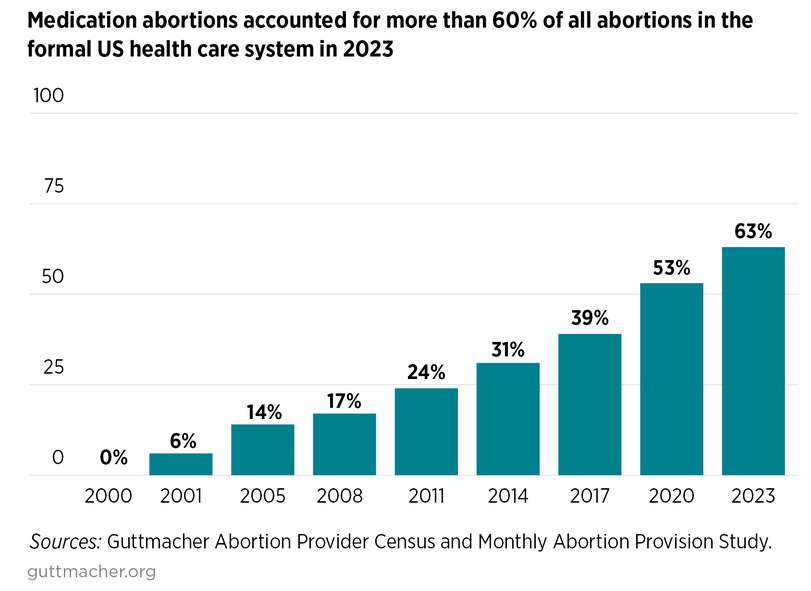How Telehealth Abortions Changed the Politics of Choice
Technology outpaces restrictive laws
One of the mysteries of the 2024 election is why anger over the Supreme Court Dobbs decision overturning Roe v. Wade, which was credited as a factor in motivating Democratic voters in 2022, didn’t make much difference.
One reason may be that the new state-level restrictions on abortion have been, in practice, less strict than many feared, in part because of the combination of two growing technologies, telehealth and medication-based abortion.
Boston-based public radio station WBUR, which leans left, has a report that brought these facts home in a concrete way:
“Massachusetts saw a substantial increase in abortions in 2023, the first full year after the U.S. Supreme Court overturned Roe v. Wade. According to state data obtained by WBUR, Massachusetts doctors and other health care providers facilitated 24,355 abortions last year, a 37% increase from 2022,” WBUR reported. “More than half of these procedures, 65%, occurred using pills that induce an abortion. Most of the change can be explained by a nearly seven-fold rise in patients from outside the state.”
The Guttmacher Institute, which defends reproductive rights, reports that “Medication abortion provided via telemedicine is as safe and effective as provision in a health care facility.” It also says that “Medication abortion using mifepristone was first approved for use in the United States by the U.S. Food and Drug Administration (FDA) in 2000,” and has grown to 63 percent of all abortions in 2023, from zero percent in 2000.
In other words, even if a woman lives in a state with draconian restrictions on abortion, she can use her cellphone or computer to talk to a doctor or pharmacist in a state like Massachusetts or New York or Illinois that has more permissive abortion laws, and have the medicine sent by mail.
The combination of mail-order pharmacies, telehealth, and medication abortions creates a reality today that is different from that when Roe was decided in 1973.
That’s not an endorsement of overturning Roe or of imposing restrictions on abortion at the state, local, or national level. Not every medical situation can be handled by telehealth and mail order.
It is, though, a reminder that the law is not the only variable affecting abortion access. Technology and markets matter too. They have a way of moving more quickly than politicians or judges can predict—and in the direction of choice.
Why Qatar Kicked out Hamas: Qatar says it will stop representing or “mediating” with Hamas in hostage and ceasefire negotiations with Israel, and some reports also say Qatar is kicking Hamas out of the country. This was being spun in some quarters as a response to Trump’s election victory. Yet the real story probably has more to do with congressional pressure.
On November 4, Senators Tim Scott, Roger Wicker, and James Risch, and 11 other Republican senators sent a letter to Secretary of State Blinken and Attorney General Garland:
We urge you to reverse the Biden-Harris administration’s policy toward the State of Qatar, whereby the administration has permitted Qatar to facilitate negotiations by hosting Hamas’ leadership. Hamas’ Doha-based leaders have exploited this arrangement, and used the relative freedom that Qatar has afforded them to oppose ceasefire negotiations in international media, host Iranian officials at Hamas’ Doha headquarters, and travel abroad. Qatari officials have said repeatedly that they would change their policy towards Hamas if the Biden-Harris administration asked it to do so, and we believe that it is long past time the administration ask Qatar to freeze Hamas leaders’ assets, shut their access to international media, end their ability to host foreign visitors, and prevent them from traveling abroad.
Second, we urge you to seek the extradition to the United States of Hamas leader Khaled Meshal, who currently resides in Qatar. The Department of Justice unsealed indictments pertaining to multiple Hamas leaders, including Mr. Meshal, on September 3, 2024, and he should face justice for his leadership of a terrorist group that has American blood and hostages on its hands.
Third, we urge you to seek indictments for Hamas’ other senior officials abroad, foremost among them Khalil Al-Hayya, who resides in Qatar.
Rep. Ann Wagner, Republican of Missouri and the vice chair of the House Foreign Affairs Committee, issued a statement that “For too long, Qatar has sheltered Hamas terrorists who seek to destroy Israel. I have put strong pressure on Qatar to spur them into action by introducing bipartisan and bicameral legislation that would force the Administration to reevaluate Qatar’s designation as a major non-NATO ally if Qatar does not bring all pressure to bear to bring hostages home—including by expelling all Hamas operatives from its territory. Qatar has, so far, failed to force Hamas to come to the table and make a deal to release the Israeli and American hostages. It is crystal clear that Hamas is not a good-faith negotiator and must never receive shelter from partners of the United States.”



